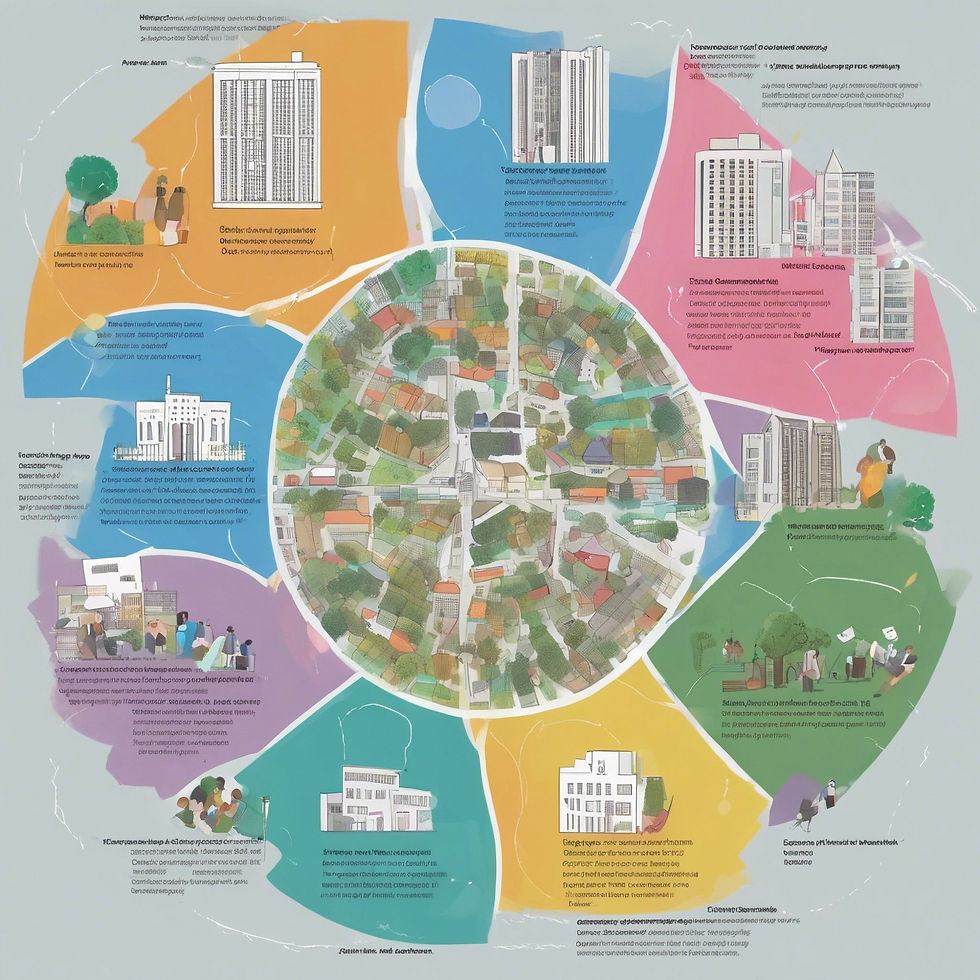Unlocking the Potential: Leveraging AI for Sustainable Urban Development
- Tauseef Bashir
- Nov 26, 2024
- 4 min read
Updated: Dec 4, 2024
Urbanization is accelerating rapidly. By 2050, approximately 68% of the global population is expected to live in cities, a significant leap from about 55% today. This shift brings serious challenges, such as rising pollution, increasing congestion, and the depletion of essential resources. As urban areas expand, the demand for sustainable urban planning intensifies. One of the most effective ways to tackle these issues is to harness the power of Artificial Intelligence (AI). With its advanced data analysis capabilities, AI can offer groundbreaking solutions for enhancing urban sustainability.
In this post, we will look at how AI can revolutionize urban planning, its benefits, numerous applications, and its role in achieving sustainable development goals.
The Role of AI in Urban Planning
AI technology provides essential tools for sifting through complex data sets, a key element of effective urban planning. For instance, AI can predict traffic trends, optimize energy usage, and assess housing needs, empowering planners to make informed decisions.
Integrating AI into urban planning utilizes technologies like machine learning, predictive analytics, and Geographic Information Systems (GIS). These innovations aid in developing smarter cities by improving resource management and driving insights for sustainable outcomes.
Furthermore, AI can speed up the planning process by automating repetitive tasks. This allows urban planners to shift their focus from manual data collection to strategic decision-making.
Benefits of AI in Sustainable Urban Development
Enhanced Decision-Making
AI can process enormous amounts of data from multiple sources, such as environmental sensors and social media. This real-time insight helps urban planners respond quickly to changes like population surges or climate shifts.
For example, AI simulations can model different policy scenarios, assessing potential impacts before actual implementation. A study showed that cities using AI tools for predictive modeling could prevent up to 30% of transportation delays by adapting traffic light patterns based on real-time traffic flow.
Improved Resource Management
AI enhances resource allocation, promoting efficient use of water, energy, and materials. Smart grids powered by AI can dynamically adjust energy distribution according to real-time demand. This capability has been shown to reduce energy waste by as much as 25%, significantly cutting down carbon emissions.
In waste management, AI analyzes patterns in garbage collection. For instance, smart waste bins equipped with sensors can estimate when they’ll be full and optimize collection routes, improving efficiency and cutting operational costs by up to 15%.
Predictive Analytics for Urban Health
AI can monitor public health trends and anticipate potential outbreaks. By examining historical data and current health metrics, AI tools can identify areas at risk, enabling quicker responses. Research indicates that cities employing AI-based health monitoring systems have reduced emergency room visits by 20% through more proactive health management.
Implementing AI in healthcare systems ensures that residents receive timely medical care, enhancing overall community well-being and sustainability.

Applications of AI in Urban Planning
Smart Transportation Systems
AI revolutionizes urban transportation by analyzing traffic data to optimize transportation networks. For instance, AI algorithms can forecast peak travel times and adjust the frequency of public transport accordingly. Cities using this technology have reported a decrease in congestion by 15%, enhancing overall mobility.
Additionally, intelligent traffic management systems can decrease waiting times at intersections, resulting in smoother traffic flow and reduced emissions.
Urban Growth Management
AI provides critical insights into managing urban sprawl. By analyzing land use patterns and demographic data, AI assists city planners in identifying suitable development zones while preserving green spaces. For example, AI models can highlight underutilized areas for development, helping to reduce urban sprawl by over 10% in some cities.
Moreover, AI can promote mixed-use developments that encourage walkability, diminishing the need for cars and benefiting both residents and the environment.
Climate Resilience
As climate change poses growing threats, AI aids in creating resilient urban environments. AI can simulate various climate scenarios, helping cities devise strategies to mitigate risks. For instance, AI-driven tools can reveal how specific infrastructure is likely to perform under natural disasters, allowing planners to prioritize upgrades or develop better recovery strategies.
By modeling different disaster scenarios, AI has helped cities outline emergency plans that reduce recovery times by up to 50%.

Integrating AI into Urban Planning Processes
Data Collection and Analysis
To utilize AI effectively, cities must establish strong data collection methods. High-quality data availability enables planners to train AI models, resulting in precise predictions and actionable insights.
Internet of Things (IoT) devices, such as sensors on traffic lights or in public parks, can deliver essential information that improves urban operations and drives efficiency.
Collaboration among Stakeholders
Achieving successful AI integration in urban planning requires collaboration among various stakeholders, including government agencies, private sector players, and community organizations. Open communication ensures that everyone works toward shared goals.
Public engagement is crucial for making sure community needs are reflected in AI applications. Involving citizens in the planning process fosters ownership and encourages support for sustainable initiatives.
Continuous Learning and Adaptation
AI systems should adopt a mindset of continuous improvement to stay relevant and effective. Urban planners need to update AI models regularly with new data to ensure accuracy.
Moreover, establishing feedback mechanisms allows cities to assess the success of AI-driven projects. By adapting strategies based on performance data, urban areas can maximize the benefits of their AI investments.
Challenges of AI in Urban Planning
Data Privacy Concerns
Using AI in urban planning often involves large data sets, raising important data privacy concerns. Cities must prioritize transparency and comply with privacy regulations to build public trust.
Implementing strong data protection measures fosters citizens' confidence, encouraging them to participate in AI initiatives.
The Digital Divide
While AI can enhance urban planning, existing inequalities in technology access and digital skills may worsen disparities in benefits. It is essential to address this digital divide so everyone can share in AI's advantages.
Cities should create inclusive technology initiatives that provide training and resources to underrepresented groups, ensuring fair access to AI benefits.

Embracing AI for a Sustainable Future
Leveraging AI for sustainable urban development opens doors to smarter, more efficient cities. By enhancing decision-making, improving resource management, and promoting climate resilience, AI addresses urgent challenges posed by urbanization.
However, integrating AI into urban planning needs collaboration among stakeholders, strong data frameworks, and a commitment to inclusivity. As cities evolve, tapping into AI's potential is vital for building urban environments that are sustainable and livable.
Embracing AI is not solely about technological progress; it centers on enriching urban living— prioritizing residents and the planet. Through thoughtful application and community participation, the sustainable cities of the future are well within reach.


